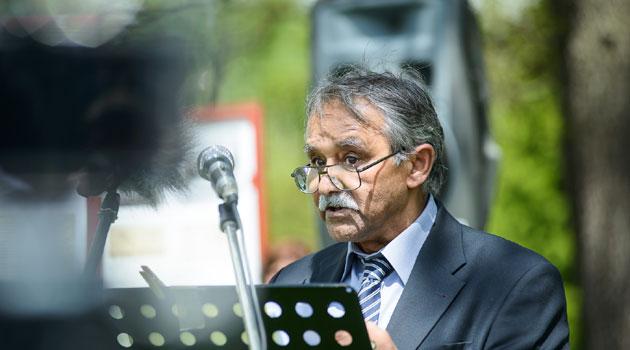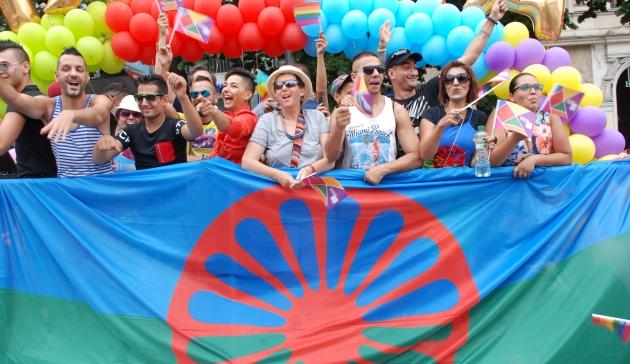Čeněk Růžička: It's strange for LGBT people to hold the rainbow and Romani flags while speaking of Roma pride

At the beginning of June the third international conference on upholding the human rights of LGBTI members of the Romani community was held in Strasbourg, France, co-organized by the Prague-based ARA ART association, whose director, David Tišer, is an activist, artist, and Romani Studies scholar who is a member of both the LGBTI and the Romani communities. Tišer posted a photo of the Romani people attending the conference holding both the international rainbow flag of the LGBT community and the international Romani flag to his Facebook profile.
The photograph sparked a stormy discussion on the social network. News server Romea.cz has published an interview with Tišer, and now we are publishing an interview with Čeněk Růžička, chair of the Committee for the Redress of the Roma Holocaust, one of those criticizing the use of the Romani flag at the event.
Q: You were part of the Facebook dispute about whether LGBTI activists who are Romani should carry the Romani flag. Can you summarize your position on this issue?
A: To begin with, I must say that I am an indigenous, travelling, Czech Rom and my perspective on the group called LGBT comes from that. I am also a Christian, although not a fanatical one. I will not use the word “purity” in this discussion, because people will ridicule its meaning. Our Roma, since time immemorial, have always shown great restraint in that area, and for most LGBT people it is not possible to speak of their having this characteristic. I am of the opinion that the Romani flag can be carried by anybody, even an LGBT person or a non-Rom, but it depends on what that person is doing at the time. It seems strange to me for LGBT people to hold the rainbow flag in one hand, the Roma flag in another, while shouting about Roma pride. For that reason, I do not comprehend how this group can organize a “Roma Pride march” when actually to do so will be grasped as ridicule by the more than 90 % of Roma and Sinti who do honor tradition. If individuals of that orientation say other Romani people discriminate against them, that is a slur that is being intentionally said (to fundraise) and is just being worn for show, or it’s a performance by a “nutjob”. I think this is all unnecessary. This is not how to build respect within the community of Roma and Sinti. I know of so many cases in the families of our Roma or even Sinti, and I have never encountered such an individual, one of our Roma, who would be condemned forever by the others, excluded from the community, or otherwise bullied. They will recommend that he live his lifestyle and not cause those around him any problems through his personal behavior. Here there is a higher principle that applies, parental feeling, mutual respect beween families.
Q: You are speaking about traditional Romani thought. How would you define the main features of Romani tradition and their meaning for Roma today?
A: Romani culture has always been formed by the environment in which Romani people have lived. Because that has always been a hostile environment, the culture of Romani people includes certain defensive elements built into it. I will not discuss those with anybody. I condemn those who have communicated that information to the repressive units of the state. Those are the Romani people who should be spurned above all.
Q: Where do you stand regarding the specific position of women in Romani tradition? Unlike Romani men, Romani women have had to, for example, behave “purely” under all circumstances and gradually acquire a position in the community over the course of a lifetime. For transgressions against “paťiv” [honor] a Romani woman could also be given corporal punishment or be publicly condemned. Do you consider that approach to have survived? Do you believe traditions can develop over time?
A: Our Roma are a bit different and the Sinti-Roma are also different. Even a man, especially if he had a family, had to behave in such a way as to not shame his family and his group. That applies in our case to this day and I am proud of that. Whenever it happened that a woman turned away from this, then it would happen that her husband would administer corporal punishment to her and our Roma would not accept coffee from her when she offered it. At the same time, a woman could administer the same kind of punishment to her husband if he transgressed. However, this is something that human beings have done since time immemorial and it doesn’t bother me – naturally as long as the people don’t cause each other serious injury when they are settling their accounts. This behavior spices up the lives of the partners, it’s evidence that they care about each other. It has always been the case, and still is, that “Ignorance is bliss”.
Q: In the Facebook discussion about homosexuality there were also voices calling it an “illness”. How, in your opinion, has it come to pass that among some Romani people homosexuality has been and to this day is perceived as something undesirable?
A: Only ignorant people speak of homosexuality as a disease. It is an orientation people are born with. There are homosexuals who are born that way and as long as they don’t hurt anybody, our Roma tolerate them. However, there are individuals who are born hetero but whose lifestyle is not satisfying to them, they are looking for change, and they get involved in some practices that are on the border of degeneracy. We despise such people. We also despise those who do not want to work and who make a living selling their own bodies, whether they be men or women.
Q: What is your view of homosexual marriages and the adoption of children by homosexual couples? Do you believe a child who grows up in a family with same-sex parents can live just a good a life as a child from a “classic” family, a man and a woman?
A: That’s a topic for a two-day conference of Romani activists and ordinary Romani people. The classically-arranged family certainly fulfills the child-rearing function best. At the same time, I admit that to a certain degree a traditional family could be replaced by women in a lesbian relationship. For those couples it would not bother me, there I would assume the maternal feeling would be developed. However, there are cases when a male couple decides to raise children and actually I do not believe families like that are desirable when it comes to the child’s development. The few cases in which a male couple adopt a child and the raising of the child happens “somehow” are being unnecessarily glorified. The exception to that are men who care for their own biological children in a self-sacrificing way. I admire them.
Q: In the Facebook discussion, you wrote about the concept of a “fake Rom” [“parom“], which among Romani people is also sometimes referred to has a “coconut”, i.e., a person who is dark on the outside and white on the inside. How would you characterize what you are calling “gadje thinking”?
A: I’m not going to answer that question. I do not feel a need to explain it to the gadje, and Roma know what I am talking about. I’ll just say that to my taste there are more than enough “fake Roma” around me.
Q: Did you ever encounter, during your own childhood or youth, criticism from your own parents or grandparents that you were not upholding Romipen?
A: No, I did not. My grandfathers and grandmothers, to say nothing of my great-grandfathers and great-grandmothers, did not get the opportunity to criticize me. They were murdered by people who said they were an inferior race. I greatly regret that is part of the history of this country. I grew up in a travelling Romani family, where the principles that had been formed and tested over centuries were upheld, and naturally that meant I couldn’t behave any other way. Our Roma were able to boast to each other that they were upholding these unwritten laws, and that still applies. Already as a child I was proud of my parents’ position. I cannot imagine changing my opinion of my life and the life of my group just because times have changed, just so the majority will “like” us, “going with the flow”, as they say. Some of the young people, or the “fake Roma”, say that we are not modern. They have basically never known the culture of the Roma based on moral principles. I comprehend that Romani culture is under pressure in society like never before. However, if I call myself Romani, then that is how I should be. Unfortunately, many are ashamed of their Romani-ness, and I believe they are justifiably ashamed, because they have never known the beauty of an authentically Romani life. They see themselves through a gadje concept of their lives, and basically they don’t really even know who they are. They cannot be gadje and they don’t want to be Roma. They deny that part of themselves. They basically have only themselve to blame for being outcasts. We’ll see how far these Roma get with their imaginary modernity.
Q: You are the chair of the Committee for the Redress of the Roma Holocaust. Are you involved with the history of the Holocaust from the perspective of all of society, or are you focused just on the aspects that concern persecuted Roma?
A: In order to comprehend the history of the genocide of Roma and Sinti, and in order to present arguments during negotiations, I must be involved with this phenomenon in a pan-European context. Exactly because I see behind the curtain, so to speak, I can allow myself to say things during those negotiations and, to a certain degree, to better defend the Roma during processes about their financial compensation as well as moral redress. I must admit that the compensation organizations complain a great deal about my activities, organizations that assess the suffering of Roma during the Nazi era wih a certain disrespect.
Q: Do you see any future figures or leaders coming up now, any role models among today’s young Roma?
A: If you mean a young leader who could mobilize Romani people, I don’t know of anybody. As a leader that person would need to have basically more experience, which as a young person he can’t have, and he must have an exceptional amount of courage and patience to become a leader over time. A leader must also reconcile himself to the fact that he must sacrifice many of life’s pleasures if he wants to be a role model. However, any successful Romani family or individual is a role model. Mainly the success of such a role model shoud be accessible to ordinary Roma. An example could be successful Romani business people, crafs people, educated people. Simply put, Romani people – and basically, this is most Romani people – who despite their own success do not think it means they can afford to make fools of the impoverished Roma.
